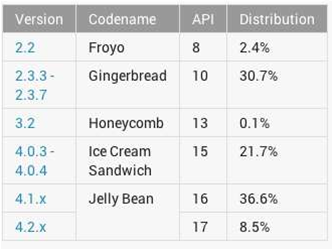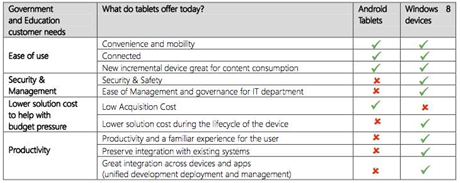Microsoft has taken aim at Google's increasingly popular Android operating system that is powering a large number of low-cost portable devices such as tablets and mobile phones, saying it is not as safe as Windows and less productive.

In a "discussion document" [PDF] published today, Microsoft said Android was behind Windows in four areas critical for the government and educational sectors, namely ease of use, security, productivity and life cycle.
Microsoft said while the Linux kernel used in Android receives security patches and fixes regularly, Google and its original equipment manufacturers did not update older versions of Android leaving them vulnerable to new and old security threats.
Citing an example of Taiwanese handset maker HTC signing the Android bootloader so that only its firmware would run on the company's devices, Microsoft said open source was by itself a problem.
"The open source nature of Android is touted by Google as a feature, not a bug, but the hackable nature of Android continues to leave big potential security holes," Microsoft claimed.
At present, Google's own figures differ from Microsoft's claim that more than half of Android devices run version 2.x or older.


Productivity and integration with existing devices were other areas where Microsoft said Android failed, but its solutions excelled.
"Windows devices take user productivity to a new level", Microsoft boasted, citing its Office suite, side-by-side multitasking using the Snap feature as well as accurate stylus input and support for multiple displays.
Although Android devices are cheaper to acquire, Microsoft said the solution cost of devices "will look quite different in the end, as there are many other costs that are likely to incur during the lifcycle of the device".
Despite the claims of inferiority in the document, Android is approaching eighty per cent market share currently, pushing aside its competitors such as Apple's iOS.
Microsoft, which pioneered smartphones running its Windows Mobile family of operating systems that are unsupported as of three years ago, has just 3.7 per cent of the market in comparison with the newer Windows Phone OS.
The company is also struggling to make inroads into the tablet device market. In July Microsoft said it would take nearly a billion dollar write down for the Surface RT tablet, which has sold poorly since it was launched.


_(20).jpg&h=140&w=231&c=1&s=0)

.png&h=140&w=231&c=1&s=0)






 iTnews Benchmark Awards 2026
iTnews Benchmark Awards 2026
 iTnews Executive Retreat - Security Leaders Edition
iTnews Executive Retreat - Security Leaders Edition
 iTnews Cloud Covered Breakfast Summit
iTnews Cloud Covered Breakfast Summit
 The 2026 iAwards
The 2026 iAwards












_(1).jpg&h=140&w=231&c=1&s=0)



